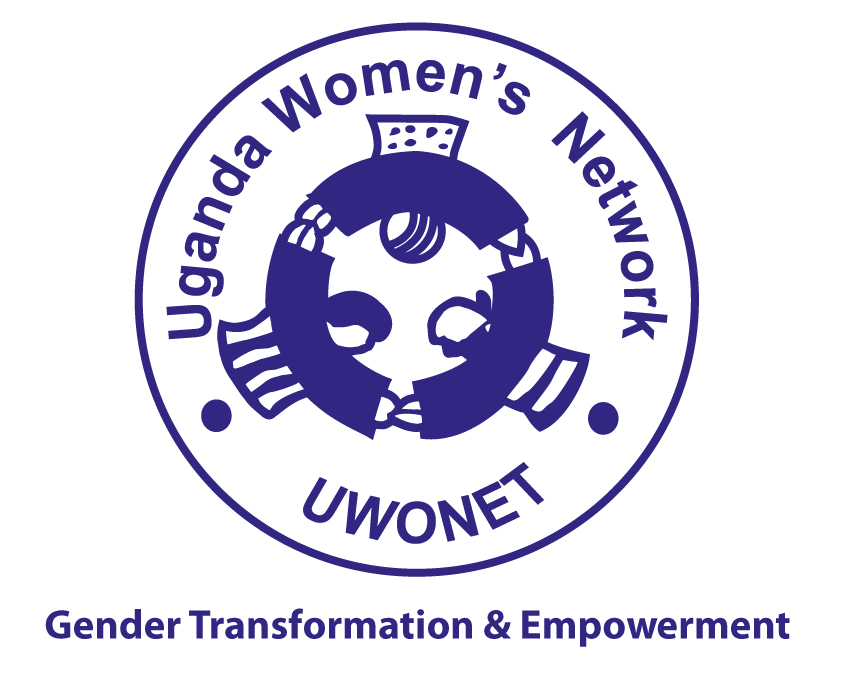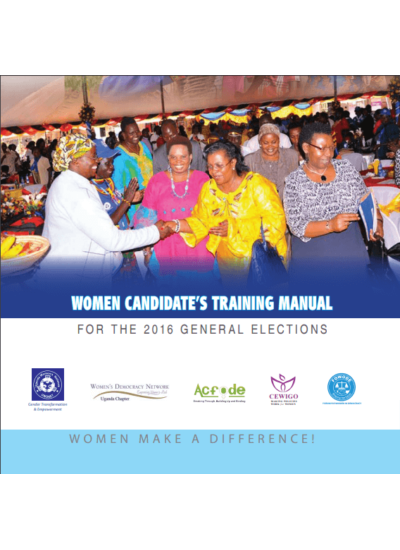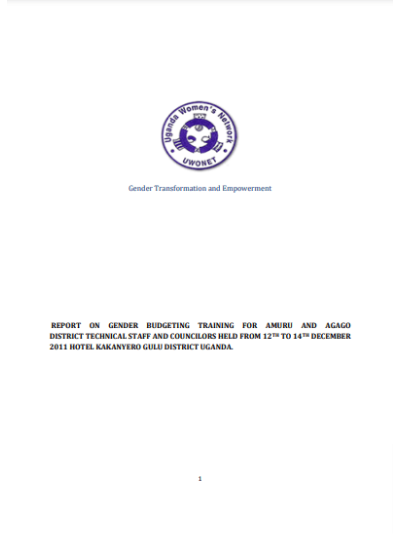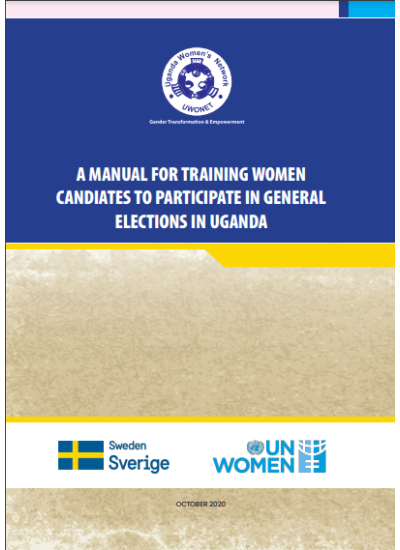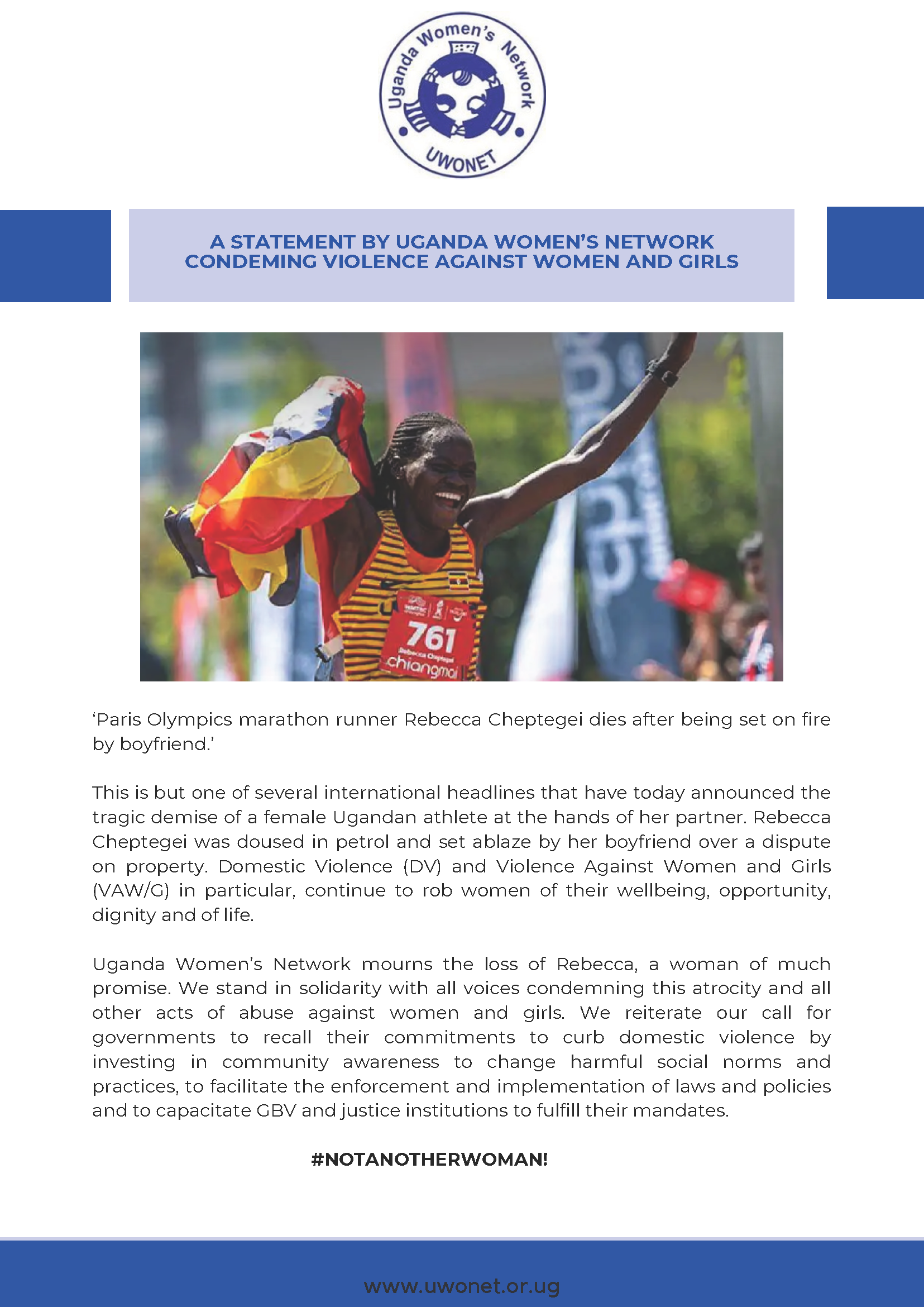
MONDAY, 9TH SEPTEMBER 2024
The Women’s Movement of Uganda convenes today to voice its concern about the escalating incidents of Gender Based Violence (GBV) and especially Violence Against Women and Girls (VAW/G). Today we stand in solidarity with the Uganda Athletics Federation, the Ministry of Education and Sports and the sisterhood of women’s rights activists in Kenya to mourn and strongly condemn the incidences of Violence Against Women witnessed in the recent past. We mourn with the family of Rebecca Cheptegei, this profound loss that they have suffered.
We are deeply saddened and concerned by the horrendous murder of Rebecca Cheptegei, a celebrated Ugandan Olympian, who was deliberately doused in petrol and set ablaze by her boyfriend. Rebecca’s death tragically illustrates the extreme vulnerabilities women continue to face, even as they break barriers and bring pride to their communities. This brutal act of violence is not an isolated incident but rather an alarming reflection of the escalating violence against women (VAW) in Uganda and across the globe. It is a painful reminder of the growing backlash and rollback on women’s rights, as women in all sectors from sports, business, government and civil society continue to face unprecedented levels of violence and oppression. It is also an indication of the low regard with which society perceives women’s rights.
In neighbouring Kenya where Rebecca met her premature end, the sports fraternity has for years suffered a spate of violent killings of female athletes, all committed by their partners. In 2021, Agnes Jebet Tirop was stabbed and beaten to death by her husband who left a note confessing to the crime. On the same day, Edith Muthoni was shot in the head by her boyfriend after an argument. In 2022 Damaris Mutua was found strangled to death, and the prime suspect was her boyfriend. The violence has also been in other ways; in 2014, Lucy Kabuu, another runner was sued by her ex-husband for control of half of her properties. For many years now, Vivian Cheruiyot has battled with her husband’s forceful control of her properties and reported complaints of emotional and physical abusive. We hope that society realises that femicide is just the end of prolonged mistreatment; because violence is like a cancer which grows in form and in cruelty. This is why everyone must be concerned about violence in any community.
According to a 2023 survey released by the Kenya National Bureau of Statistics, 1 out of 3 women in Kenya has experienced Gender-Based Violence. The survey also found that over 40% of women in Kenya are likely to face a lifetime of physical and sexual abuse from their partner. According to Femicide Count Kenya which pulls data from local media, 152 women were killed in 2023, and these are only the reported cases.
The situation is not any different in Uganda. According to the 2023 Uganda Police Annual Crime Report, 15,184 people were survivors of Domestic Violence (DV), 10,792 of whom were female. A total of 249 persons were killed as a result of aggravated domestic violence; 95 were male and 113 were female. There has been continued maiming, sexual abuse and denial of property rights to women. The 2022 National Survey on Violence in Uganda conducted by the Uganda National Bureau of Statistics (UBOS) also found that Intimate Partner Violence (IPV), which is often a precursor to femicide was at 45%, the highest being in Acholi region at 78%. The statistics depict the persistent social norms, community apathy and low prosecution rates that continue to contribute to the prevalence of such crimes as they are recorded as Gender-Based Violence which is underrated and under-prosecuted as a seemingly lesser crime.
The statistics in both countries (Uganda and Kenya) are significant; they are alarming indicators of a regional emergency of growing backlash against women and a roll back on women’s rights. Upon the establishment of the East African Community (EAC), partner states made a commitment under Article 6(d) of the EAC Treaty to adhere to certain fundamental principles including the rule of law and accountability for social justice, gender equality, and the recognition, promotion and protection of human and people’s rights. The drive to regional integration has unfortunately not prioritized the advancement of gender justice. It is shown by the disparity in legal/regulatory frameworks and judicial jurisprudence on women’s rights and gender, divergent national strategic priorities and national attitudes to women’s rights.
Related to this is the question of justice for female survivors. Beyond the judicial processes and outcomes, what does substantive justice look like in the case of a female survivor violence? Does our justice system take into account victim-blaming that reinforces Violence Against Women and Girls? Does it expressly recognise and declare that these women have been harmed, and that they were not at fault? Does it engender social support and solidarity for female survivors? This is food for thought for all of us.
As the Women’s Movement we are deeply disappointed by the Ugandan media’s low coverage of incidences of Violence Against Women. A simple scan of the level of reporting of Rebecca Cheptegei’s murder reveals the low interest as opposed to international media which up to now continues to run the story, amplifying the connection between Violence Against Women and gender equity. The media tends to focus on popular topics like politics, sports and music with little space for meaningful discussion of women’s concerns, illustrating the trivial manner in which women’s issues are often handled. There is also a tendency for news reports to focus only on survivors of violence to the exclusion of their oppressors missing the opportunity to shine a touch on the criminality of perpetrators’ action. As a result, perpetrators are shielded from public outrage and condemnation. The Women’s Movement has also noticed the ‘victimhood reporting’ by some media actors in cases of violence against men, and yet Violence Against Women which is statistically more prevalent and even harmful is down played. There is nothing to be gained in casting one gender against the other when dealing with matters of violence.
As the 2026 general elections draw close, the Women’s Movement is concerned about the violence that women have been known to suffer. A 2020 study conducted by the Economic Policy Research Centre (EPRC revealed that at least 68% of women experienced election-related in Uganda. Election violence against women in Uganda results from shifts in violence from homes to public spaces, the method of queuing behind candidates, the militarisation of electoral processes, and the commercialization of elections. This violence is aimed at dissuading women from registering to vote, casting their ballots, participating in rallies or political events, influencing their voting choices, and punishing them for doing so. This has an effect on women’s participation in election processes. The Women’s Movement calls upon the government to take early steps to prevent this kind of violence.
We reiterate our call to government to recall its commitments to curb GBV and domestic violence in compliance with the numerous regional and international legal instruments that promote protection of women’s rights and advance gender equality. While we appreciate the Government of Uganda’s stand on issues of Violence Against Women, the government must take a firm stance against all forms of VAWG by holding perpetrators accountable and creating safe spaces for women to thrive.
Our Call to Action
As a country, Uganda must recommit to ensuring the protection of women and girls at all levels of society. The time for complacency is over. Violence Against Women and Girls is a societal plague and a crisis. It can no longer be ignored and demands immediate coordinated attention and sustained actions as it stands in the way of multisectoral development. We, as a nation, must rise to protect women and girls for only then can we ensure true progress and development for all.
To the Government and Justice, Law and Order Sectors
- Strengthen the enforcement of domestic violence laws, including faster prosecutions, deterrent and proportionate penalties for perpetrators of violence.
- Increase budget allocations to capacitate GBV prevention and justice institutions to fulfill their mandates. Including support services for survivors.
- The Ministry of Education and Sports must spearhead reforms that address violence against female athletes by enacting specific laws that protect women in sports. This includes setting up regulatory bodies to handle complaints and implementing strict consequences for perpetrators.
- Investing in community awareness to change harmful social norms and practices
- Enhance women centeredness in prevention and response services.
To national governments in East Africa and Africa in general:
- As signatories to various sectoral treaties and human rights instruments, governments must recognize the crucial role that the safety and well-being of women and girls play in achieving sustainable development. A united front by governments against gender-based violence (GBV) across countries will lead to positive outcomes in the elimination of violence against women and girls (EVAW).
- Prioritize bilateral efforts to create cross-border systems that enhance coordination, policy enforcement, monitoring, reporting, and accountability in preventing and responding to gender-based violence (GBV).
- Governments should advocate for the development of the African Union Convention on the Elimination of Violence Against Women and Girls to strengthen policies that protect and promote women’s rights.
To The Community and the Public:
- Break the culture of silence and shame that surrounds domestic violence by speaking out, supporting survivors, and reporting perpetrators.
- Engage in community awareness programs that challenge gender stereotypes, negative social norms and violence.
- Actively support women’s rights organizations (WROs) and other CSOs that are at the forefront of preventing and responding to
To the Sports Community, we encourage you to continue speaking out, and where possible, report incidences of abuse. As a community, we must create safe spaces for whistleblowing and support to sports women/athletes.
To the Media:
The media plays a crucial role in shaping public opinion and must embrace its duty to educate, raise awareness, and promote positive narratives about gender equality.
- We urge the media to prioritize the coverage of violence against women, highlighting the perpetrator’s criminal actions and avoiding narratives that excuse or obscure the violence.
- We demand that media houses commit to developing comprehensive guidelines for reporting on gender-based violence, ensuring that the focus remains on justice and accountability rather than survivor -blaming or sensationalism.
- We call on media houses to prioritize coverage of female athletes' achievements and stories of abuse, ensuring that the conversation on women’s safety in sports remains prominent.
To the Women’s Rights Advocates and Allies:
- Let us not lose hope. We must persist, remain steadfast, and continue to stand in solidarity in our collective activism for a Uganda where no woman lives in fear of violence.
- We urge all advocates to come together to demand justice for Rebecca Cheptegei and all the women and girls that have been violated and continue to face violence. We continue pushing for structural reforms that will protect all women from marginalisation, discrimination and oppression.
To the Family of Rebecca Cheptegei:
From the Uganda Women’s Movement, we extend our deepest condolences. No words can truly express the heartbreak we feel at your tremendous loss. We stand with you in solidarity and pray for your strength as you navigate this unspeakable tragedy.
Rest in Power, Rebecca Cheptegei.
#NotAnotherWoman
#EndViolence
#EndGBV
- Version
- Download 44
- File Size 1.23 MB
- File Count 1
- Last Updated September 11, 2024
